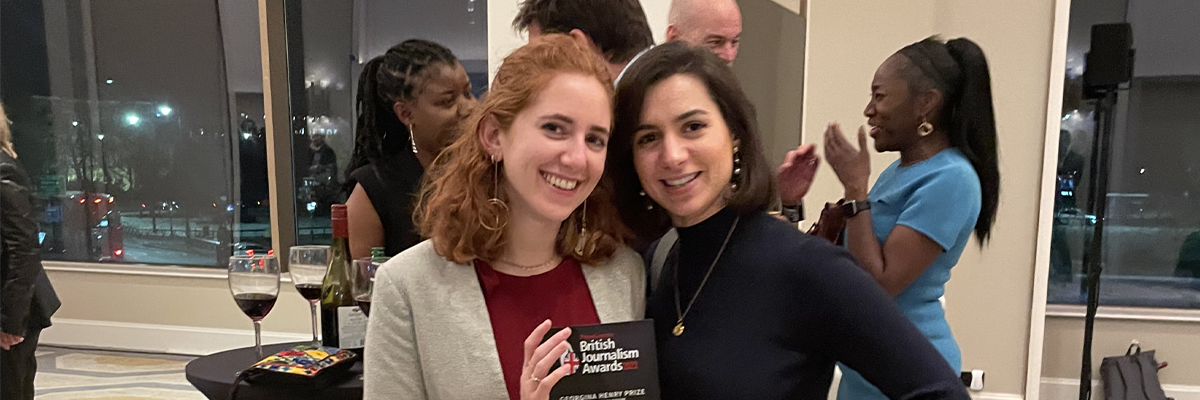Co-founder Kate Samuelson (MA Magazine Journalism, 2015) was delighted when digital newsletter Cheapskate won the Georgina Henry Award for Digital Innovation at the 2022 British Journalism Awards. Kate’s passion for the newsletter format and helping people access culture means around 10,000 readers receive tips on free London events every week.
 “Winning the award meant so much to me – it was probably one of the best moments of my whole life,” says Kate Samuelson, co-founder of the newsletter Cheapskate.
“Winning the award meant so much to me – it was probably one of the best moments of my whole life,” says Kate Samuelson, co-founder of the newsletter Cheapskate.
“My business partner, Georgia [Weisz], and I have worked so hard on Cheapskate every weekend and most evenings for the past almost four years, so getting that recognition felt amazing.”
Cheapskate won Women in Journalism’s Georgina Henry Award for Digital Innovation at the British Journalism Awards 2022. The newsletter was founded in 2019 and has been a passion project for Kate and Georgia, who produce it in their spare time. Each week, the newsletter suggests two free, London-based events per day. Over the years, additional features have been added to give readers an even better chance to enjoy themselves without a large disposable income.
“We do it because we’re passionate about the idea, and because we really do believe in connecting people with amazing free events. We enable people to feel part of a community and immersed in culture.”
Kate’s love for writing and interviewing took her from Bristol to London, where she completed the MA in Magazine Journalism at City in 2015.
“I absolutely loved it. It was a real contrast with my undergrad where I only had six contact hours a week – then at City, I had six-plus a day,” she says. “The skills that you learn are useful no matter what area of journalism you end up pursuing which is good as there are so many paths you can take these days.”
It was during this time the idea of Cheapskate emerged. Kate wanted to experience London to the fullest while being a student on a limited budget but sometimes felt overwhelmed.
“I knew there were so many amazing, free events happening all the time, every day, but found it really difficult to work out what, when and where. That led me to realise that there was a gap in the market in terms of connecting people with information about free events.”
 When Kate and Georgia joined forces and Cheapskate became a reality in 2019, they hadn’t foreseen their first few years in business would see both a pandemic and a cost-of-living crisis.
When Kate and Georgia joined forces and Cheapskate became a reality in 2019, they hadn’t foreseen their first few years in business would see both a pandemic and a cost-of-living crisis.
“We launched not long before the pandemic, probably only about seven months before lockdown, and when that happened, initially, we thought “Okay, well, is that it? How can we do a newsletter about free events when there are no events?””
But they refused to throw in the towel so soon.
“We pivoted to focusing on the best free virtual events and kept going throughout lockdown because there was actually a lot of stuff going on; like virtual life drawing classes or even venues putting on virtual comedy shows. And the feedback we got at that time was that people found it really helpful, especially people who were living on their own. They felt like it helped them connect with other people and feel part of a wider community, even though they were alone at home.”
Has Kate seen an increased interest in free events recently?
“Definitely. I feel like the information we provide is more important than ever. Not having access to culture is really detrimental to people’s mental health. Right now, when people are having to choose between heating and eating, culture – understandably – isn’t a priority. But I think what’s great about Cheapskate is that it helps people see that even if they don’t have money to spare, there are still things happening literally every day that they can get involved in that don’t cost anything. That’s the message we’re trying to get out there.”
Cheapskate has never used digital marketing or targeted advertising to grow; its popularity has primarily depended on word of mouth. At first, it was friends and family, but three appearances on BBC News got the word out to a much larger audience, and now Kate is aiming to reach 100,000 subscribers.
“I know there are thousands more Londoners that would love what we’re doing, so we want to try and reach those people,” she says. “And I think once we’ve grown to a significant size, then we’re going to start thinking about whether we could scale and branch out to other cities.”
What is Kate’s advice to someone who would like to start their own project, either full-time or outside of their primary work?
“I’d say it’s really important to be passionate about your idea because it requires so many unpaid hours of work to give it a proper go. If you don’t fully believe in the idea to begin with, I think it’ll be hard to motivate yourself to do that.“
And what is Kate looking to do in the future?
“I’ve joined a media startup called The Know as Editor-in-Chief. The Know is a daily current affairs newsletter which helps people feel informed and up-to-date with the news, but in a non-overwhelming way.
“I’ve worked for quite a few well-established media companies before but never a start-up, so this is a big change. But my work with Cheapskate really made me realise how much I enjoy building a brand, thinking of methods to reach new subscribers, and working out things like the tone of voice of a new company. This opportunity at The Know allows me to play a big part in an early-stage business.”
A big congratulations to Kate Samuelson for being recognised at the British Journalism Awards 2022, and a thank you for sharing her story!
